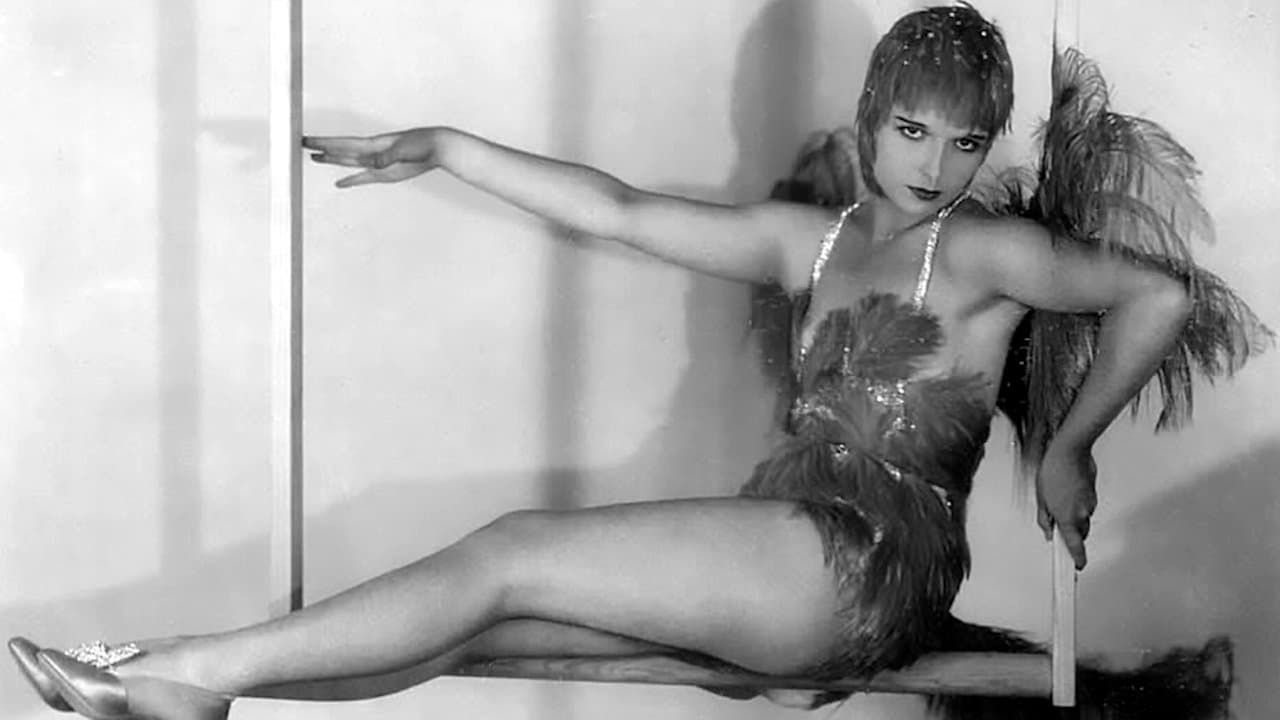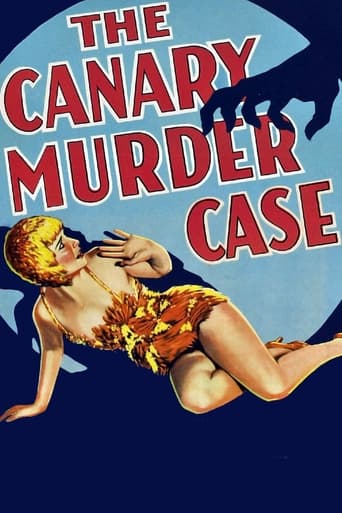

Who payed the critics
... View Morehyped garbage
... View MoreAn old-fashioned movie made with new-fashioned finesse.
... View MoreExactly the movie you think it is, but not the movie you want it to be.
... View MorePhilo Vance (William Powell) is on the case of a showgirl named "The Canary" who was murdered in her locked apartment. The suspect list includes a number of men The Canary was blackmailing and all were in the vicinity of her apartment the night she died.Unfortunately, the backstory behind the making of The Canary Murder Case is much more interesting than the movie. Originally, The Canary Murder Case was to be a silent picture. But at the last minute, the studio decided to turn it into a talkie. Scenes had to be re-shot and lines had to be dubbed. But one of the film's stars, Louise Brooks, refused to participate. The studio hired another woman who resembled Brooks, shot her from the back, and used her voice for some of the worst dubbing I've ever heard. It's really an interesting story. The result of all this effort, however, is a very uneven film that often feels cobbled together.Getting past the backstory, The Canary Murder Case is dull. It's an early talkie and it shows. They just didn't know how to shot sound. The plot has a reasonably interesting twist near the end, but it is telegraphed so far in advance that it shouldn't come as a surprise to anyone. Watching William Powell in this early Philo Vance effort, it's hard to believe this is the same man who would go on to play the absurdly (and I mean that in a good way) animated Nick Charles. Finally, the final reveal is so poorly shot that it's actually one of the duller moments of the film. What should have been the highlight is anything but.Overall, a 4/10 from me.
... View MoreIn "Paramount on Parade" William Powell essayed a spot on parody of Philo Vance, an intellectual man-about-town amateur detective, and when he was shot Inspector Heath (Eugene Palette) happily congratulated Fu Manchu. S.S. Van Dine had written his first Vance book in 1926 - "The Benson Murder Case", and it was a huge success. Philo Vance was independently wealthy and was always called into the cases by Heath when the police had given up - of course he always solved the crime!! In 1929 Paramount acquired the film rights to the first three Van Dine books and the first to roll out was "The Canary Murder Case". William Powell who had excelled in villainous roles was a brilliant choice for Vance. He played up the suavity and intellectualism but eliminated the stuffiness and pretentiousness that was quickly turning a lot of readers off!!Louise Brooks in feathers was enough to make this movie memorable, even though you didn't hear her distinctive throbby voice. She played "The Canary", a beautiful blackmailing showgirl who has set her sights on marrying into society and has her claws into Jimmy (James Hall) who in turn has patched things up with fellow show- girl Alice (for all Jean Arthur's top billing she has two small scenes).Definitely not as interesting as "The Greene Murder Case", once Brooks departed (she was the victim) after 15 minutes, there were no more ladies to brighten up proceedings. The plot was then propelled by a group of suspects - most of them older men whom the Canary was blackmailing. The climax came with a poker game, staged by the insufferable Mr. Vance, in an effort to use psychology to flush out the murderer. Until then chief suspect is young Jimmy but in a twist the murderer is killed and Philo Vance then takes centre stage to explain just how the murder had been done. Most interesting character is good old Ned Sparks as, believe it or not, Louise's husband back from "up the river" and eager to get his hands on some of her ill gotten loot!!The film was caught in the middle of the talkie change over. Initially filmed as a silent in 1928 it was extensively re-shot to make it a 1929 all talkie, which explains Louise Brook's reluctance to return for dialogue dubbing. The studio got their revenge by substituting the "dese, dems and dose" voice of Margaret Livingston - you just couldn't imagine that voice issuing from Louise's fair lips.
... View MoreIn what turns out to be his second talking picture William Powell introduces to the screen the character of debonair detective Philo Vance. Like his later Nick Charles, Powell as Vance likes to live the high life though he's not as big a drinker. He gets called in by an old friend Charles Lane (not the acerbic character actor we all know from TV and films) but an older gentlemen who is concerned about the continuing involvement of his son James Hall with nightclub singer Louise Brooks known only as The Canary. This girl is a much cruder version of Lorelei Lee who is determined to marry wealthy and insure a steady income for her pleasures. Hall is engaged to good girl Jean Arthur, but can't keep away from Brooks.She's got a whole gang of other men on the string as well and she also has an ex-husband so when Brooks turns up dead there are no lack of suspects for Powell to work through. The police however with dumb as a brick Eugene Palette as Sergeant Heath seem to zero in on Hall.For those who like the vivacious Jean Arthur in the classic films she was yet to do you won't find her here. She's pretty wasted as a typical good girl part. One player who will be a revelation is Ned Sparks as Brooks's ex-husband who claims he's not an ex. He's not the lovable sourpuss we later saw in many films, but a rather vicious animal. Totally a surprise.William Powell's perfect diction and stage training make The Canary Murder Case hold up well even today. Unlike so many of his contemporaries at this time, Powell seem to know instinctively how to play for the new talking picture camera. Sound made his career.For those who enjoy nice detective stories with a closed ring of suspects, you can't go wrong with The Canary Murder Case.
... View MoreA famous "transition" film. One shot as a silent and partly re-shot for talkies. William Powell stars as Philo Vance. Jean Arthur plays a show girl. Louise Brooks is the "Canary." Of course this film is famous because Brooks refused to return from Europe to re-shoot scenes as a talkie. The studio then released news her voice would not record well. To get even more even they hired Margaret Livingston to dub Brooks' voice in a high nasal New York accent. Livingston also appears in a few long shots in a Louise Brooks hair cut.Slow but OK murder mystery. Brooks disappears after about 15 minutes; Arthur has no real part. That leaves us with James Hall as the dupe, Eugene Palette the dumb sergeant, Charles Lane the father, Oscar Smith the desk attendant, etc. Lots of talk.Brooks is gorgeous and in the credits you note she gets downplayed from 2nd to 4th billing. Another Paramount jab. Brooks indeed had a fine voice even though I've only seen a couple of lousy westerns she made. She was a beauty and had a good voice. But she sure was difficult. And her "Lulu in Hollywood" memoir doesn't change my mind about her. By the way: I loved her in Beggars of Life as well as Pandora's Box and Diary of a Lost Girl.
... View More